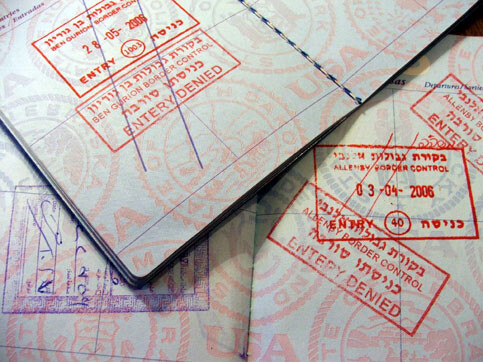
(Image: Maureen Clare Murphy)
On the night of Sunday, July 30, my husband and I became deportees.
We had left the West Bank a few days earlier when our one-month visa was due to expire. Since arriving in Ramallah in January 2005, we had been leaving the occupied territories right before our visa expired and re-entering the country to get a new visa at the border. But since the Hamas victory in the Palestinian Legislative Council elections, we had been hearing about other US passport holders who were being denied re-entry when they left to renew their visas. We left nervously but still thinking we would be able to return, if only for a month.
We arrived in Tel Aviv and stood at the passport control counter; the woman in the booth soon called for backup support. This was not completely unexpected; whenever we present our passports at the airport or at the bridge, the Israelis take one look at Walid’s passport, see that his birthplace is listed as Palestine, and become uncontrollably agitated, as though no one is allowed to predate their silly state. We were led away to a corner of the large area, somewhat hidden by a partition. There we found a few others who looked like Palestinians and a tired-looking Ethiopian couple, the woman holding a sleeping child. We sat and waited.
Walid was called in alone and was gone for a very long time. I finally got up and started to eavesdrop at the door, and that’s when I realized that we were in trouble.
Walid and the Israeli official came out of the room. Stunned, Walid told me that we were being denied entry altogether; he had tried to explain that we were leaving the area for good in three months and that we would not try to renew after that time elapsed, and when that didn’t work, he tried to get a one-week visa so that we could at least get our personal belongings and make arrangements. The Israeli official claimed that although he didn’t agree with the policy, he couldn’t accommodate us. Walid urged that he must have some discretion, and he claimed he had none. I started to argue with him, telling him that we had an apartment to shut down and a cat to provide for. (In half-heartedly preparing myself for the worse-case scenario while on the flight, I had decided that telling any Israeli that I was needed to care for my elderly mother would be unlikely to move them, but that telling them about a cat that needed to be placed in a caring home might hit the right chord. I reasoned that like many westerners, Israelis would be moved by the plight of a homeless cat much more than they would by a 72-year-old Palestinian mother suddenly left alone.)
My tactic backfired. The Israeli official told me that as a tourist I should not have either an apartment or a cat. Talking was useless. There we were, three Americans — we assumed from the way he spoke that the Israeli was a dual citizen — one, probably born in Brooklyn but by virtue of his religion having the right to tell the other two that they had to leave, that Walid had no right to linger in or near his birthplace, that I could not go to my hometown where my roots ran deep.
I was allowed to make a call, and so I called the US Embassy. The person I spoke to offered to call a contact of his at the Interior Ministry, but he admitted that that would probably not affect the outcome. He read me some Israeli law which we both concluded was not at all relevant to our situation. He called back as promised to say that his contact was unable to do anything about my situation and that I should call the embassy in Jordan and the consulate in East Jerusalem because someone there is following cases like mine.
We were returned to the same waiting area and were joined by another Palestinian who was being deported and a chatty guard, Uzi Tal. It was the guard who explained that we were being deported - until that moment, the word “deported” had not been spoken. Uzi took it upon himself to explain that we would not be able to return for 5 to 10 years. My mind went blank.
I called my mother to explain what happened, and her voice was barely audible. She was at least as disappointed as we were.
The flight back to Jordan took off just after midnight and was practically full, mainly with young Israelis who seemed to be tourists. Sunday was the day the Israeli government committed the Qana massacre in Lebanon, but here were these fun-loving Israelis, traveling to an Arab country and seemingly without a care in the world, and certainly with no apparent sense of national guilt for the catastrophic damage they were causing in Lebanon and the ongoing bloodletting in the Gaza Strip.
Walid and I arrived in Amman too dazed to speak. We checked into a hotel and fell asleep around 3 am. A few hours later, I woke up and had my first thought of the day: we are homeless. My mother-in-law would take us in, of course, but for the first time in my life, I tried to think of what the future holds or what our next move should be, and I was drawing blanks. I had no clue.
Almost six weeks have passed since that awful night. The day after our deportation, my mother put in an application to restore an old ID card of mine that had lapsed in the 1980s, and each day she is given a promise that it will soon be available. We wait. Each morning, I have a slight sense of anticipation, hoping that this will be the day our luck starts to turn. And each day I am disappointed. The afternoons and evenings are when depression sets in; I feel trapped and completely powerless, at the mercy of faceless and indifferent Israelis (and perhaps Palestinian middlemen) who are deciding my fate. Perhaps deciding is too purposeful a word — maybe they are just letting it slide away. For as long as I am in limbo, I don’t have much of a life. I go through the motions but with little sense of direction or purpose. My life is on hold.
We live on the hope that my return is just a matter of time. Eventually, we reason, the Israelis have to relent and issue my hawiya (ID), and with that in hand, getting a Palestinian passport should be a piece of cake. And then I will petition for my husband to join me. We both feel strongly that I must return the first chance I get, if only to exercise my right to return and my right to be home at a time of my choosing, not at the whim of some Israeli policy designed to control the indigenous population and punish it for electing Hamas to office. But we also realize that Walid’s chances of entry any time soon are less than 50-50 and that there is a good chance that we will be separated. We have not been able to think clearly about how to handle that.
Ida Audeh is a Palestinian who works as an editor with a North American company and who had been living with her husband in Ramallah until the Israelis decided in July that that was unacceptable.
Related Links





